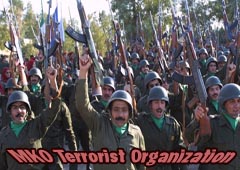The enthusiasm of some hawks in Congress for the Mujaideen-e Khalq (MEK) has started to create a bit of a backlash. The Terrorism, Nonproliferation, and Trade Subcommittee of the House Foreign Affairs Committee  invited the cult’s leader, Maryam Rajavi, to testify remotely as part of a panel on ISIS. That prompted one former State Department official to withdraw from the meeting entirely. Robert Ford, the former ambassador to Syria, has also said he won’t take part in a panel that includes Rajavi:
invited the cult’s leader, Maryam Rajavi, to testify remotely as part of a panel on ISIS. That prompted one former State Department official to withdraw from the meeting entirely. Robert Ford, the former ambassador to Syria, has also said he won’t take part in a panel that includes Rajavi:
“I didn’t want to be on a panel with the MEK. I was shocked they invited the MEK. What the MEK has to do with the Islamic State, I don’t have a clue,” Ford told FP. “I told the committee to put me on a panel without the MEK or I wouldn’t appear.”
The refusal of these former officials to play along with some hawks’ disturbing admiration for the MEK is appropriate, but it is unfortunate that it should be necessary. The attention and praise lavished on the MEK in recent years by former officials, retired military officers, and politicians has been an embarrassing spectacle. Now the strange infatuation that many hawks have with the “former” terrorist group is spilling over into the regular business of Congress. As if to underscore how misguided inviting Rajavi was, a copy of the cult leader’s testimony shows that she intends to use her time to argue for regime change in Iran. Ali Gharib comments:
But more to the point, the MEK has always had only one goal: the overthrow of the Iranian regime. For decades, it has tried to shoehorn regional and geopolitical dynamics into its aim, irrespective of any salient connections.
The plan to bring down ISIS by toppling Iran’s government, then, is little more than the latest chapter of group’s 50-year history of monomaniacally trying to install itself atop the Iranian government.
This obviously has nothing to do with combating or understanding ISIS, and allowing her to speak at such a meeting just lends a totalitarian cult a platform from which it can promote its own warped agenda. Inviting Rajavi demonstrates exceptionally poor judgment, and her testimony will make a farce of the proceedings tomorrow. It would be one thing to invite a representative of this awful group if it had anything useful to contribute to the subject being discussed, but of course it doesn’t. The invitation to Rajavi is simply a way for hawks on this subcommittee to flaunt hostility to Iran and to indulge the fantasy that the MEK speaks for the Iranian opposition.
By Daniel Larison

